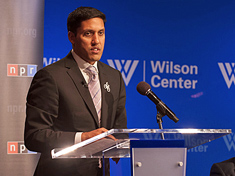-
USAID Administrator Rajiv Shah on Public-Private Partnerships and the Future of Aid
March 7, 2014 By Paris Achenbach What’s the best way for America’s chief development agency to help other countries reach prosperity and democracy? Increasingly, it’s creating partnerships not just with other governments, but with the private sector too, says USAID Administrator Rajiv Shah in this week’s podcast.
What’s the best way for America’s chief development agency to help other countries reach prosperity and democracy? Increasingly, it’s creating partnerships not just with other governments, but with the private sector too, says USAID Administrator Rajiv Shah in this week’s podcast.What’s the best way for America’s chief development agency to help other countries reach prosperity and democracy? Increasingly, it’s creating partnerships not just with other governments, but with the private sector too, says USAID Administrator Rajiv Shah in this week’s podcast.
“When we think about the future of engaging the world through developmental activity, we’re not thinking anymore about just paying for infrastructure and services, as important as those activities are,” says Shah, who spoke at the Wilson Center on February 14. “Instead, we’re now thinking about how do we build the kinds of partnerships that really, in a results-oriented way, can reshape the vulnerability in the world in which we live.”
“How do we build the kinds of partnerships that really, in a results-oriented way, can reshape the vulnerability in the world in which we live?”USAID is working with a host of companies, including Google, which does everything from “mapping Lahore communities to find and vaccinate young kids” to “helping to invest in entrepreneurs creating new businesses to tackle extreme poverty and make a living for themselves by using private means;” Cargill, which was able to “redirect a $7 million shipment of rice and put it quickly into the Somalian economy” to reach famine-affected areas; Wal-Mart, which is reaching “hundreds of thousands of small-scale farmers” with technical assistance and connecting them to a market that “is going to be there in the long haul and sustain their gains;” and GE, which is helping to bring power to hundreds of health clinics in East Africa.
This “new model of development,” as Shah puts it, now composes 40 percent of USAID’s programming, and he said the hope is to increase that over time. “What that effectively means is that when there are disasters, instead of simply providing aid assistance, we’re also laying the groundwork for recovery and rehabilitation.”
What Does America Stand For?
The U.S. response to Typhoon Haiyan is an example of the power of these partnerships, Shah says – and the two most important things about the response were “far from the cameras.”
The first happened before the storm hit on November 8: the U.S. shared predictive and climate data that allowed the Philippine government to evacuate 700,000 people. “We all saw those early estimates of death toll being far higher than what people ultimately found was the consequence, and it’s in large part because in partnership we were able to get that done,” Shah says.
The second was getting energy and food systems and health clinics back in operation, which was in part due to “military and developmental humanitarian partners doing great work,” but also “pulling together a consortium of companies – mostly local – that got those systems back up in running and did so quickly.”
“This discussion should really be about what America stands for in the world and how we stand for it,” says Shah:
And the answer to that question cannot only and just always be what our military is doing. It’s got to be more comprehensive in a manner that captures certainly our diplomatic and development efforts in government, but also captures the full range of American institutional partnerships around the world in business, science, innovation, and technology.
Rajiv Shah spoke at the Wilson Center on February 14 as part of the “National Conversation” series, co-sponsored by NPR.
Friday Podcasts are also available for download on iTunes.
Topics: Africa, agriculture, Asia, cooperation, democracy and governance, development, disaster relief, economics, featured, food security, foreign policy, Friday Podcasts, funding, global health, humanitarian, military, nutrition, Pakistan, Philippines, podcast, poverty, risk and resilience, security, Somalia, U.S., USAID, youth
 A Publication of the Stimson Center.
A Publication of the Stimson Center.

 What’s the best way for America’s chief development agency to help other countries reach prosperity and democracy? Increasingly, it’s creating partnerships not just with other governments, but with the private sector too, says USAID Administrator
What’s the best way for America’s chief development agency to help other countries reach prosperity and democracy? Increasingly, it’s creating partnerships not just with other governments, but with the private sector too, says USAID Administrator 

